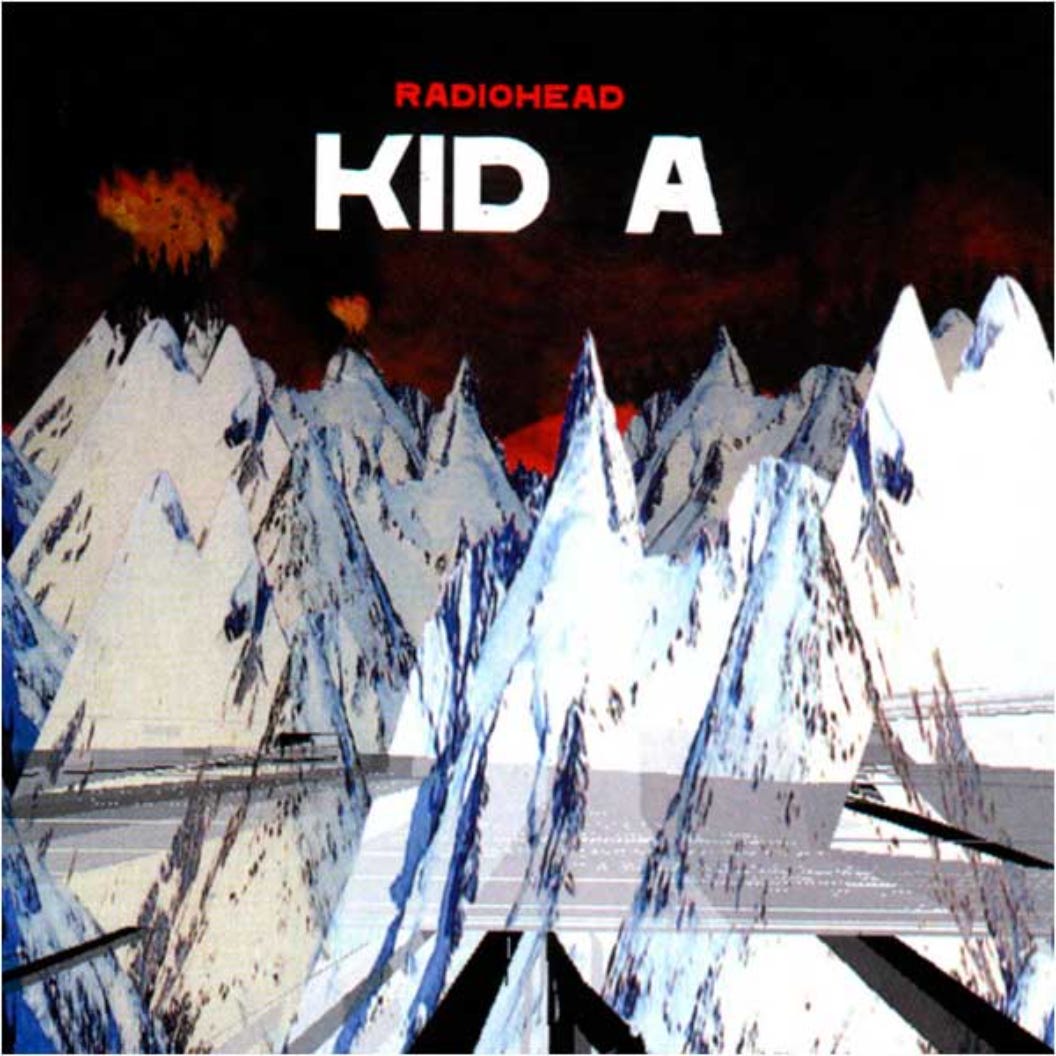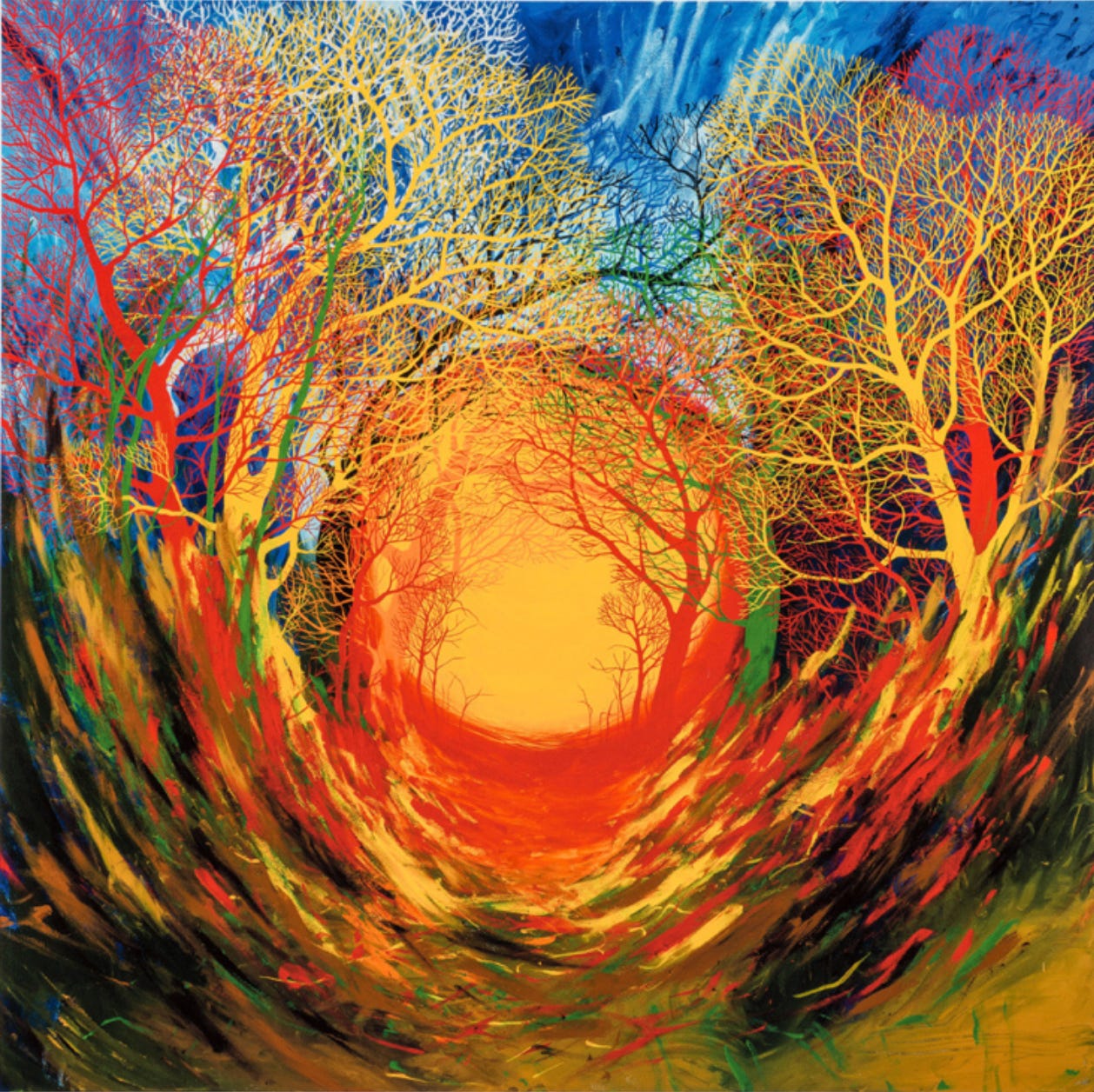Welcome aboard The Bus!
ORIGINALLY PUBLISHED (1.40) 22 AUGUST 2022
The Stop
Stanley Donwood1 (1968 - ) is an English graphic designer, artist and writer. Best known for designing all of Radiohead’s artwork since 1994, Donwood was born in Essex and educated at the University of Exeter.2 An ‘enigmatic’ artist, he is considered one of the ‘most important visual artists of his generation.’ Concerned with ‘socio-political issues’ and ‘using propagandist graphics and thoughtful illustrations,’ Donwood employs ‘uniquely evocative and eerie imagery’ to address the world’s ‘emotional, political and environmental turmoil.’
Though best known for providing Radiohead a distinct visual signature to accompany their music,3 Donwood’s prints and etchings ‘stand out in their own right.’ Among other cities, his work has been exhibited in Australia, Los Angeles, Tokyo, Rome, London and San Franciso - and he designed the covers for reissues of 21 JG Ballard4 novels.
A well-regarded author, Donwood has published several books including collections of short stories (Slowly Downward: A Collection of Miserable Stories, Household Worms and Humor), the novel Catacombs of Terror! - a ‘mash-up of noir and gothic horror’ - and Bad Island - a ‘starkly beautiful graphic novel about the end of the world.’ In addition to non-Radiohead collaborations with Thom Yorke and serving as Art Director for The Bomb (2016), Donwood has also worked with Robert Macfarlane - the author and academic concerned with the interconnection of memory, landscape, nature and environmentalism. Holloway (2012) is about their journey into the ‘shadows, spectres and great strangeness’ of the South Dorset holloways,5 and in Ness (2019) they use words and images to form a ‘minor modern myth’ about nature reclaiming an island.
Donwood’s art also graces the cover of Macfarlane’s Underland: A Deep Time Journey (2020),6 and Macfarlane’s description - and a conversation with Donwood about his painting - explains much about the artist’s juxtaposition of beauty and darkness:
I love the cover. It kept me writing through the most difficult times — the thought of it, the image of it …. In one sense it’s a holloway, a sunken lane, leading the eye on and in. What is at the end of it looks like this incandescent glow. But when I spoke to Stanley about it he said, “No — that’s in fact a nuclear explosion. That solar glow is the last thing you will ever see as the blast wave rushes towards you.”
The Detour
Today’s Detour is a short article from The Critic, giving advice on how best to truly see London: essentially, stick to unknown side streets, alleys, mews and parks. And the best advice? Keep looking up - that’s where the good stuff is. Even if you don’t live near London, it’s entertaining - and probably applicable for how to really see any major city.
The Recommendation
Today’s Recommendation is Robert Macfarlane’s Mountains of the Mind (2003). One of the best books I’ve read in the past few years, the book (Macfarlane’s first) is an exploration of why people - including himself - have had their imaginations captured by mountains and been drawn to them, despite their danger. It’s a fascinating, gripping read - and the penultimate chapter in which he recounts the (ultimately futile) attempts by Mallory to climb Everest in the early 20th century remains one of the best bits of prose I’ve read.
From the back: To those who love mountains, their wonder is beyond dispute. To those who do not, their pull is beyond reason. In this groundbreaking and now classic work, Robert Macfarlane explores how mountains have come to hold us spellbound, drawing us up into the high places - sometimes at the cost of our lives.
The Sounds
Today’s playlist is composed of five excellent tracks from albums for which Stanley Donwood did the cover art: Thom Yorke’s ‘Black Swan’ from The Eraser (2006), Radiohead’s ‘Idioteque’ from Kid A (2000), Atoms for Peace’s ‘Before Your Very Eyes …’ from AMOK (2013), Radiohead’s ‘Exit Music (For A Film)’ from OK Computer (1997) and Johnny Greenwood’s ‘Milky Drops from Heaven’ from the soundtrack to the documentary Bodysong (2003).
The Thought
Today’s Thought is a timely quotation from Salman Rushdie:7
‘A book is a version of the world. If you do not like it, ignore it; or offer your own version in return.’
If you have a thought on this Thought - or any part of today’s issue - please leave a comment below:
And that’s the end of this stop - I hope you enjoyed a brief diversion from your regular journey!
Thanks to everyone who subscribes - I genuinely appreciate your interest and support. If you like The Bus, please SHARE it with a friend or several hundred.
If you haven’t climbed aboard, please do!
Until the next stop …
Real name: Dan Rickwood.
Donwood met Radiohead’s singer Thom Yorke at Exeter. His first impression of Yorke was that he was ‘mouthy’ and ‘someone [he] could work with’, while Yorke decided he’d either end up not liking him or ‘working with him for the rest of my life.’ Refreshingly (in a way), I could find only limited biographical information about Donwood. There are plenty of interviews, reviews, etc. - but their main focus is on his work - which is as it should be - and that is what you should check out. Sources for this Stop include: Stanley Donwood/Radiohead, Stanley Donwood (Riseart), Stanley Donwood (Penguin), Stanley Donwood (Famous Graphic Designers) and Slowly Downward.
His relationship with Yorke and the band is so close he’s often referred to as its sixth member. Donwood notes his own ‘obsession with nuclear apocalypse, Ebola pandemics, global cataclysm,’ goes ‘together quite well’ with Radiohead’s ‘particular brand of unsettling melody.’
Ballard is Donwood’s ‘favourite author of the 20th (and a bit of the 21st) century.’ For information about Ballard, see: JG Ballard (Britannica)
A ‘hollow way’ is a sunken path deep in the bedrock created by centuries of walking, riding and erosion.
Recommended in The Bus Issue 1.3 - Demeter.
Rushdie has a great website, filled with information. See: Salman Rushdie.











